This says a lot about the fact that most prestigious international journals are in western countries. More of them in Eastern countries and we would have another setting of holidays. On a funny note, here in Finland, the most relevant call for funding has its deadline on January 8th. It bugs me…
23.12.2024 08:13 —
👍 0
🔁 0
💬 0
📌 0
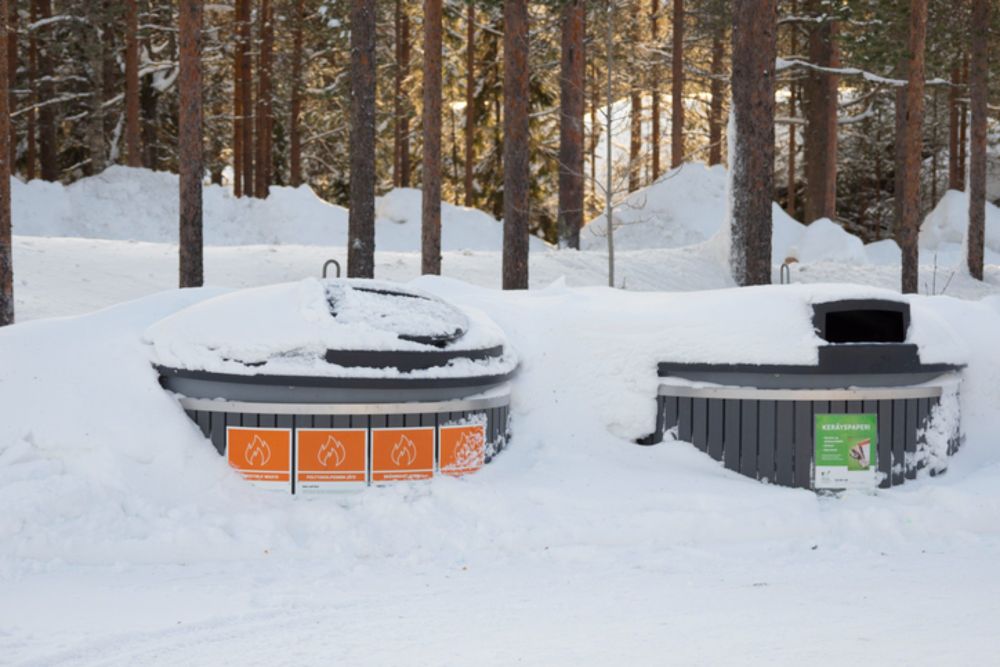
Finland downgrades MDPI and Frontiers – will others follow suit?
Decision to downgrade 271 journals on quality and operating model concerns sparks debate
I was approached re: the Finnish decision to downgrade MDPI & Frontiers journals in 🇫🇮 rankings (THE article).
This decision was based on broad patterns, including in our recent study "The strain on scientific publishing"
(link: direct.mit.edu/qss/article/...)
A quick 🧵 1/n
#SciPub #AcademicChatter
20.12.2024 08:44 —
👍 130
🔁 67
💬 10
📌 8
Working on and publishing, please add me! 🫣
11.12.2024 17:57 —
👍 1
🔁 0
💬 1
📌 0
J’aimerais bien être ajouter. Merci!
08.12.2024 17:45 —
👍 1
🔁 0
💬 1
📌 0
Would you add me, please? 😃
07.12.2024 08:48 —
👍 1
🔁 0
💬 1
📌 0
Hi Brian, would you mind adding me to the list? Thanks 😃
04.12.2024 17:24 —
👍 1
🔁 0
💬 0
📌 0
Hi, would you please add me to this list :)?
04.12.2024 17:23 —
👍 1
🔁 0
💬 1
📌 0
11/2 🙌 Core Team
The core team behind this work included:
Myself (@gracoroza /
@gracoroza.bsky.social
)
@MarkKLWong /
@markklwong.bsky.social
@altermatt_lab /
@florianaltermatt.bsky.social
Martin Gossner, who is not on social media
04.12.2024 11:38 —
👍 3
🔁 0
💬 1
📌 0
12/ 📢 Still a Preprint
This work is currently a preprint, and we welcome any comments, feedback, or criticism! 📝
You can access the full text and code to explore the details and share your impressions: https://doi.org/10.21203/rs.3.rs-5395446/v1.
Let’s discuss! 💡
04.12.2024 11:36 —
👍 1
🔁 0
💬 0
📌 0
11/2 🙌 Core Team
The core team behind this work included:
Myself (@gracoroza / @gracoroza.bsky.social)
@MarkKLWong / @markklwong.bsky.social
@altermatt_lab / @florianaltermatt.bsky.social
Martin Gossner, who is not on social media
04.12.2024 11:36 —
👍 0
🔁 0
💬 1
📌 0
11/1 🙌 Acknowledgements
This work was only possible thanks to the incredible amount of open-access data and a huge collaborative effort involving over 20 authors from around the world. 🌍
This research was part of the Blue Green Biodiversity (BGB) initiative, a collaboration between EAWAG and WSL.
04.12.2024 11:36 —
👍 1
🔁 0
💬 1
📌 0
10/ 🚀 What’s Next?
To truly understand biodiversity loss, we need global collaboration, long-term monitoring, and policy changes that integrate functional diversity into urban planning and conservation.
04.12.2024 11:36 —
👍 1
🔁 0
💬 1
📌 0
9/ 💡 Why This Matters
Ecosystem resilience relies on functional diversity—the traits that allow ecosystems to function 🌱⚙️.
Homogenised traits mean ecosystems are less adaptable to change 🔄⚠️.
Conservation strategies must:
Protect minimally impacted habitats 🌳.
Promote habitat heterogeneity 🌾.
04.12.2024 11:36 —
👍 2
🔁 0
💬 1
📌 0
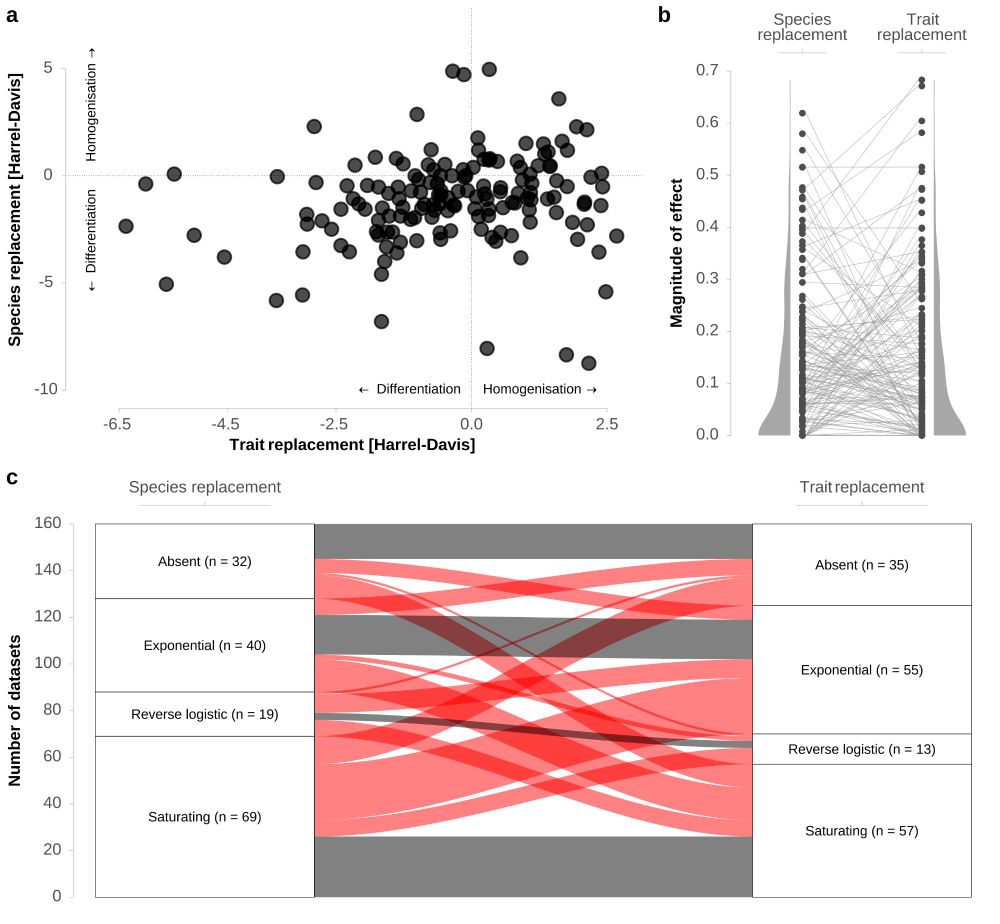
8/ 🔄 Fig. 5: Species vs Trait Mismatch
-While 59.3% of datasets show species and traits changing in the same direction, traits are disproportionately homogenised 📏🌱.
-No differences in effect magnitude, but baseline pressure shapes responses.
-Exponential ↗️ and saturating ➡️ turnover often pair.
04.12.2024 11:36 —
👍 2
🔁 0
💬 1
📌 0
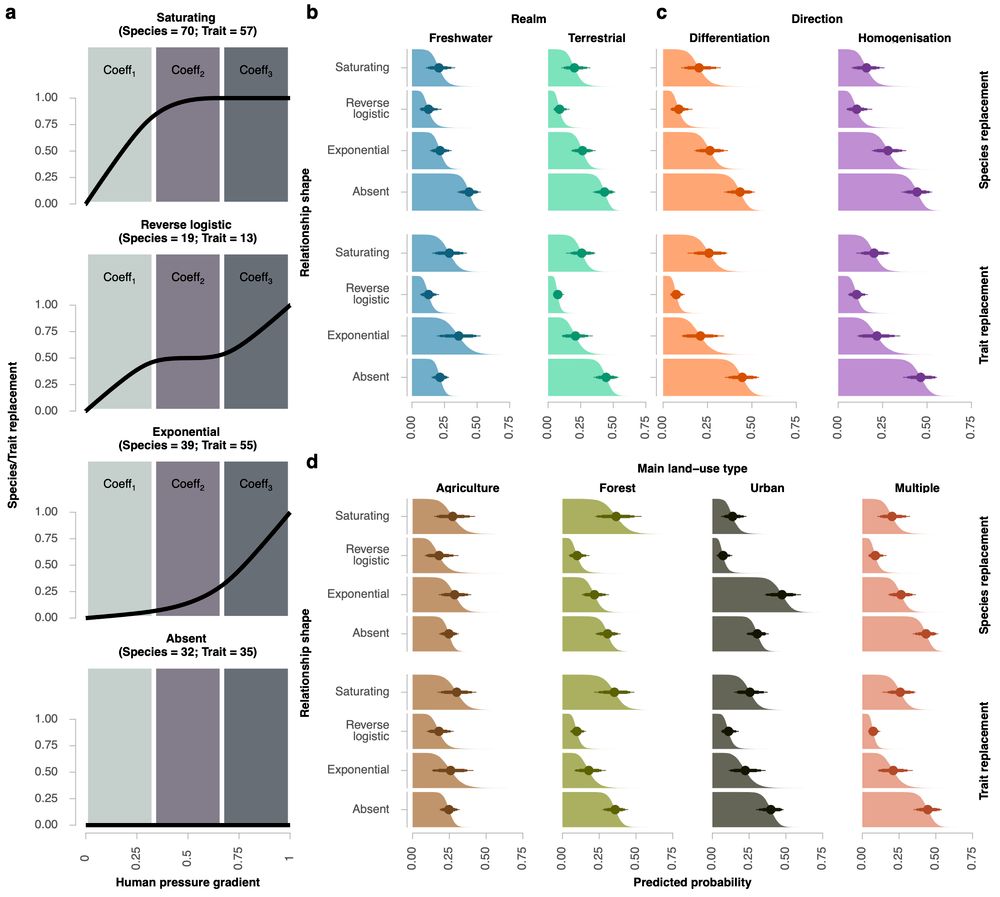
7/ 🔄 Fig. 4: The Shape of Turnover
Species and trait turnover face tipping points under intense pressure.
Saturating responses dominate species turnover (43.7%) 🐟🌳, showing high sensitivity to small pressures.
Exponential responses dominate traits (34.4%) 🌆🌱, especially in urban areas.
04.12.2024 11:36 —
👍 1
🔁 0
💬 1
📌 0
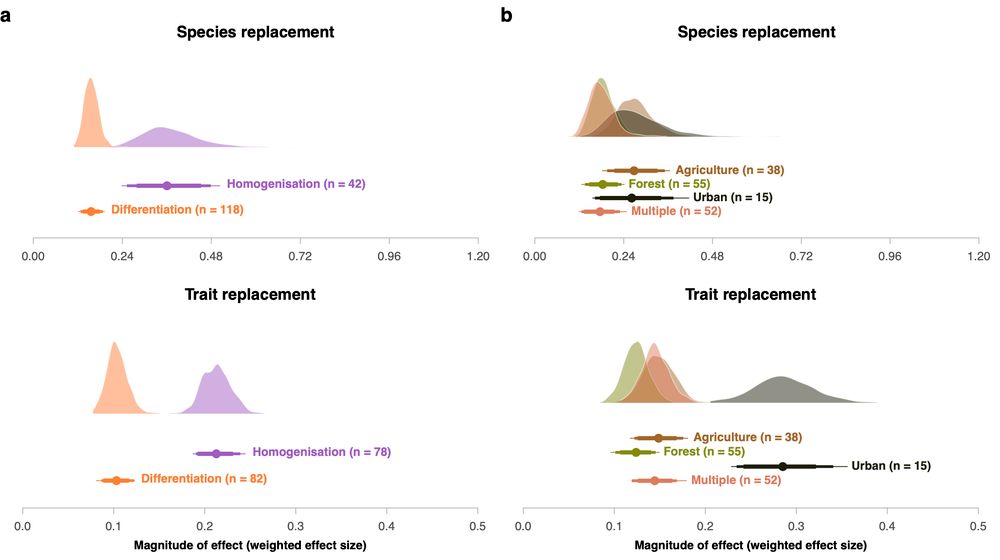
6/ 📊 Fig. 3: Homogenisation Hits Harder
Differentiation is more frequent, but human pressures drive homogenisation much more strongly.
Urban areas are hotspots, with 73.3% of urban datasets showing trait homogenisation.
This intense impact leaves ecosystems fragile and less adaptable. 🌇⚠️
04.12.2024 11:36 —
👍 2
🔁 0
💬 1
📌 0
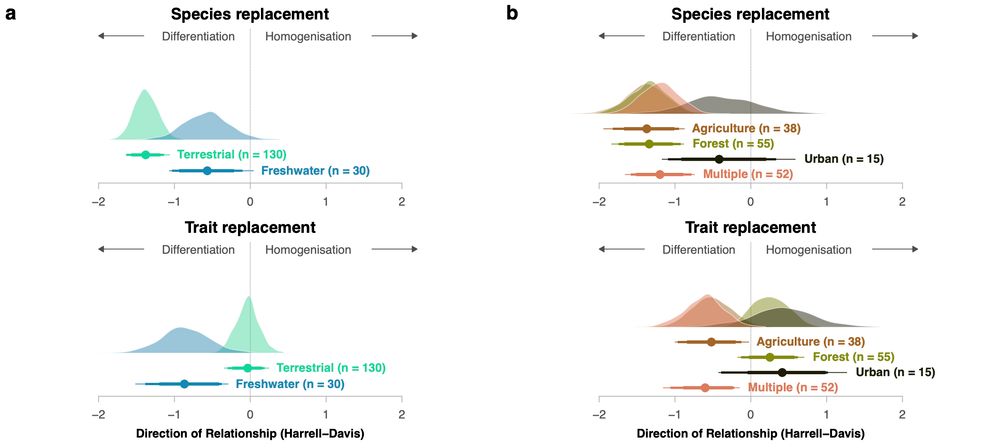
5/ 🧩 Fig. 2: Differentiation vs Homogenisation
Differentiation is more common globally (70% of datasets), but freshwater and terrestrial ecosystems show heightened vulnerability to homogenisation—species in 40% of freshwater datasets and traits in 46.3% of terrestrial datasets.
04.12.2024 11:36 —
👍 1
🔁 0
💬 1
📌 0
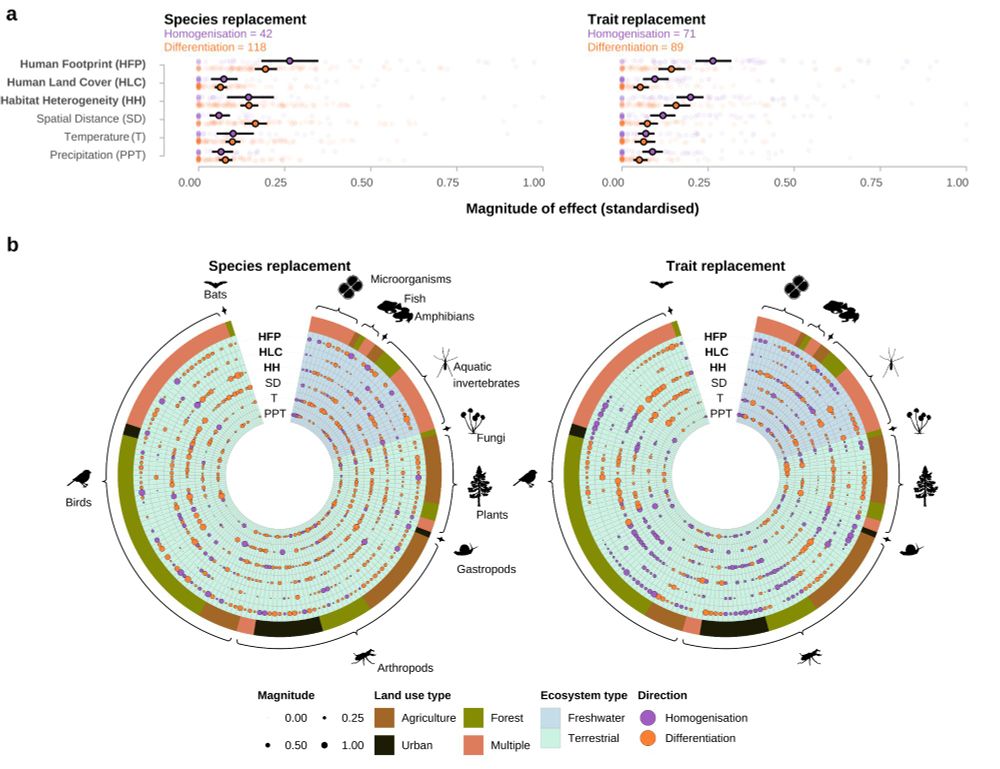
4/ 🧩 Fig. 1: Human Pressure > Climate & Geography
Our first key finding: Human pressure (as in human footprint) outweighs climate and geography, being responsible for 21.5% of species turnover and 20.6% of trait turnover.
Human activity reshapes biodiversity far beyond natural gradients. 🏙️🌾🌍
04.12.2024 11:36 —
👍 1
🔁 1
💬 1
📌 0
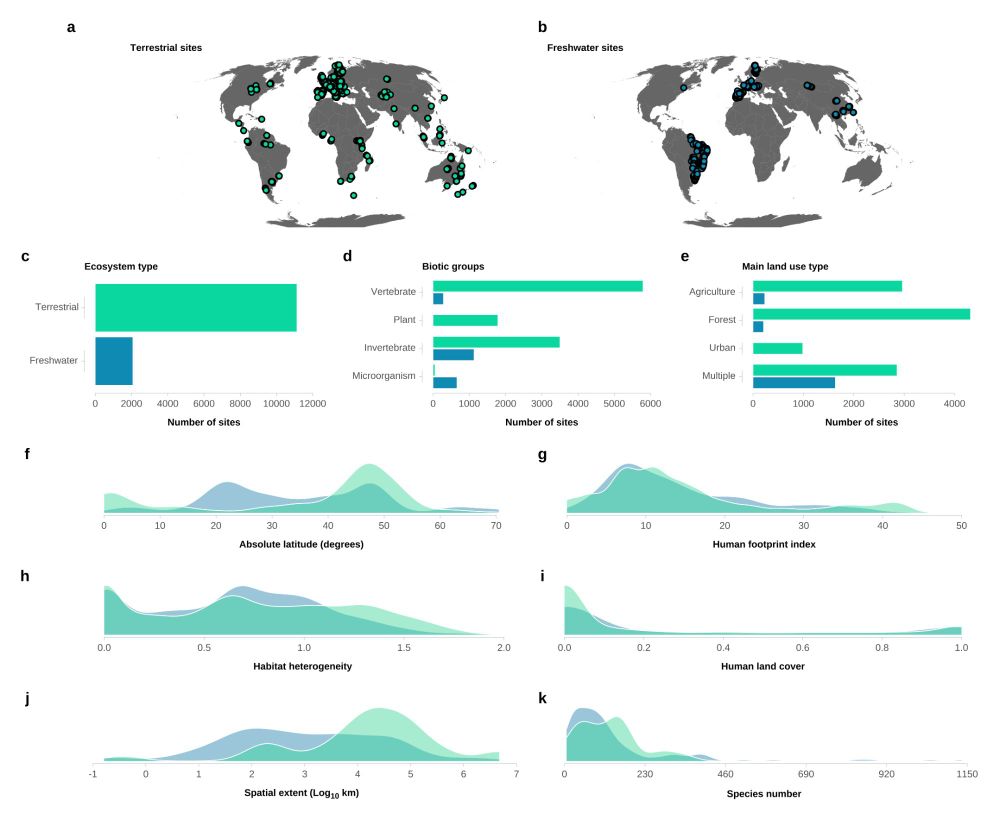
3/ 🔬 What We Did:
Analysing 160 datasets of over 13,000 local communities across 9 taxa and multiple ecosystems, we studied:
Species turnover (who’s replaced)
Trait turnover (what's replaced)
And how human pressure stacks up against climate or geography.
04.12.2024 11:36 —
👍 1
🔁 0
💬 1
📌 0
2/ 🌏 The Problem:
Human activities—urbanisation, agriculture, and more—are reshaping biodiversity at a global scale. But HOW do these pressures affect species and the traits they carry? 🤔
Hint: It's not just about losing species; it’s about losing variety.
04.12.2024 11:36 —
👍 2
🔁 0
💬 1
📌 0
1/ 🚨 New Preprint Alert! 🚨
We just published our latest work: "Human pressure homogenises species and traits globally". 🌍🦋🪴 Dive into the findings below or check out the preprint here:
https://doi.org/10.21203/rs.3.rs-5395446/v1.
A 🧵👇
04.12.2024 11:36 —
👍 11
🔁 2
💬 1
📌 1






